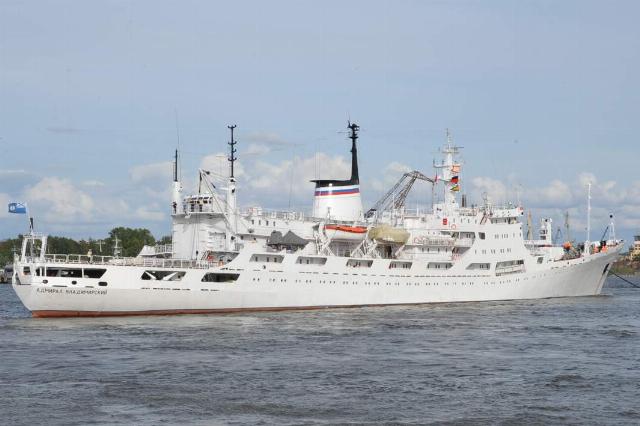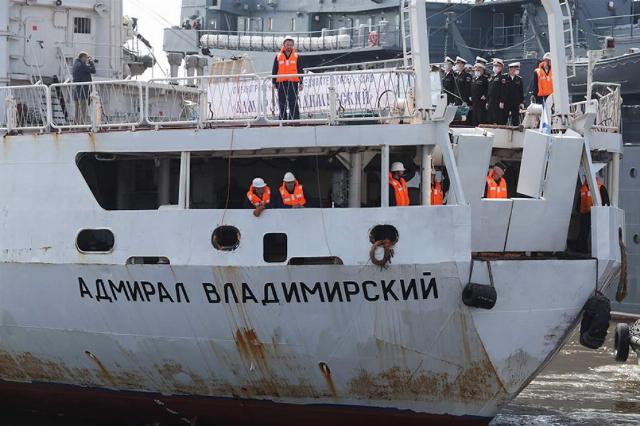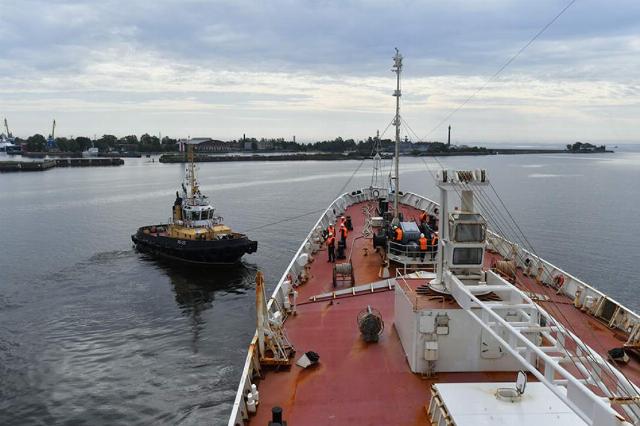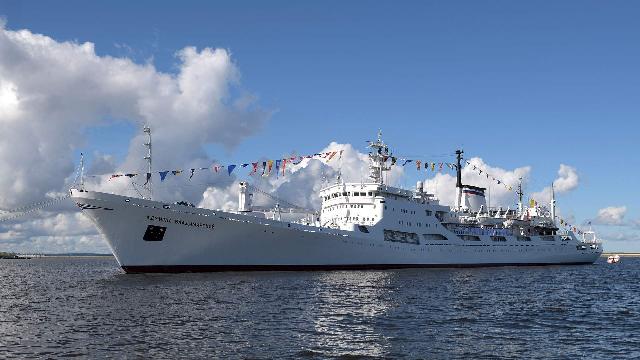The oceanographic vessel Admiral Vladimirsky made an unofficial visit to the port of La Guaira in Venezuela.
The voyages of Russian research vessels are causing concern among Western politicians and the military. One of them, the oceanographic vessel Admiral Vladimirsky, made an unofficial visit to the port of La Guaira in Venezuela and continued its journey to the Atlantic Ocean. What tasks oceanographic vessels perform and why their research raises concerns in the West — in the Izvestia article.
Oceanographic vessel Admiral Vladimirsky
The oceanographic research vessel Admiral Vladimirsky, which is making a sea voyage, made an unofficial visit to the port of La Guaira in Venezuela.
According to the Russian Defense Ministry, during the stay, the crew replenished water, fuel and food supplies and conducted a technical inspection of the vessel. After making the visit, the ship set sail and headed for the designated area of the Atlantic Ocean according to the cruise plan.
Venezuelan President Nicolas Maduro said the visit confirms the joint work of the two countries' militaries.

The President of Venezuela, Nicolas Maduro.
Image source: Photo: AP Photo/Cristian Hernandez
The planned oceanographic cruise dedicated to the 80th anniversary of the Victory began on March 13, when the ship left Kronstadt. "During the cruise, it is planned to obtain unique bathymetric data, conduct oceanographic and hydrometeorological studies along the route of the oceanographic research vessel," the Defense Ministry said.
The Admiral Vladimirsky was built in 1975, and six such vessels were added to the Navy at that time. At the moment, this is the only remaining representative of the series. In recent years, the ship has repeatedly made trips to the shores of Antarctica. In 2019-2020, it took part in a round-the-world oceanographic expedition of the hydrographic service of the Russian Navy.
The vessel has a displacement of 9120 tons, a length of 147.8 m and a width of 18.6 m. It can reach speeds of up to 19 knots. It can be in autonomous navigation for up to 90 days and is capable of traveling 18 thousand miles. It has two hydrographic measuring boats, 19 specialized laboratories, as well as a platform and hangar for the Ka-25 helicopter.

Photo: TASS/Yuri Belinsky
Image Source: iz.ru
The main tasks of the vessel are to observe currents, research in the field of chemical hydrology, marine biological observations, marine meteorology, actinometric observations, wave observations, and aerological observations.
"The world's oceans can be imagined as a living being in which the movement of waters, temperature, density, and salinity of water are constantly changing," military expert Dmitry Boltenkov told Izvestia. — All this needs to be monitored in order to create adequate navigation maps and have an idea of the hydrometeorological situation. "Admiral Vladimirsky" is likely to go further to Antarctica. He will walk around this continent and conduct research there — to make maps, understand the nature, weather and sea in this region. This is necessary to solve the problems of the national economy, for example, for fishing. And also to solve possible military tasks, so that the commanders of warships or submarines have an idea of what they can expect — what kind of weather, what kind of sea, current, etc. We no longer have other vessels that have the same capabilities as Admiral Vladimirsky.

Photo: TASS/Alexander Demyanchuk
Image source: iz.ru
Studying the world's oceans is a must for any fleet, military expert Viktor Litovkin told Izvestia.
— We use the World Ocean and its riches. We need to know where the currents are, where the shoals are, where the reefs are, where the fauna and flora are," he explained. The ocean is the most unexplored element, we know more about space than about the ocean. A hydrographic vessel is one of the ways to explore the ocean.
According to the expert, there are clearly not enough such vessels in the fleet.
Why are they afraid of Russian research vessels in the West?
The voyages of Russian research vessels in recent years have attracted increased attention from the intelligence services of Western countries.
"They consider them scouts. Because they listen to the airwaves, study the depths of the ocean, and so on," Viktor Litovkin explained. — In fact, this is the same kind of intelligence, but only one thing is intelligence in the interests of the armed forces, and another thing is intelligence in the interests of science and ensuring free navigation. The West wants to know everything about us and does not want us to know about it. Hence all the problems. This is ordinary Western arrogance and arrogance.
Photo: RIA Novosti/Alexey Kudenko
Image source: iz.ru
In April 2023, Western media reported on a joint "investigation" conducted by the security services and public broadcasters of Denmark, Norway, Sweden and Finland. It claimed that Russian fishing and research vessels were allegedly used to monitor the underwater infrastructure. In addition, Russia was accused of planning sabotage in the North Sea in case of conflict. The "investigation" separately noted the oceanographic vessel Admiral Vladimirsky, which was explicitly called a spy ship.

Photo: RIA Novosti/Alexey Kudenko
Image source: iz.ru
Dmitry Peskov, the Russian president's press secretary, denied the accusations at the time. "These media outlets of the mentioned countries (Denmark, Norway, Sweden, Finland) made a mistake in their investigation, they again groundlessly prefer to blame Russia for everything," he said. "We would prefer that they pay more attention to the topic of the terrorist attack on Nord Streams, the need for a transparent, urgent and broad international investigation into these unprecedented terrorist acts and sabotage," the Kremlin spokesman stressed.
At the beginning of the year, another research vessel, the Yantar, attracted the attention of the British authorities. The kingdom's Defense Minister, John Healy, said the Navy had sent two ships, the Somerset frigate and the Tyne patrol ship, to monitor its movement. He claimed that Yantar was allegedly collecting intelligence and mapping the country's underwater infrastructure. Earlier, the British military observed the Amber in November last year.
Bogdan Stepovoy
Julia Leonova

